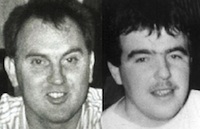
One of the oldest outstanding inquests in the North of Ireland has finally begun in Belfast.
The inquest into the deaths of two Republicans shot dead in an ambush by an elite British Army unit over twenty years ago began on Monday.
Sinn Féin councillor Martin McCaughey and Dessie Grew were killed near Loughgall, County Armagh in October 1990. Both men were Volunteers in the Provisional IRA.
They were shot close to isolated farm outbuildings at Lislasley outside Loughgall. The building had been under surveillance for some time by the SAS (Special Armed Services).
It was always believed the pair were victims of Britain’s ‘shoot to kill’ policy of deliberate political assassination.
In May 2011, the Supreme Court in London finally cleared the way for the inquest to begin. It ruled that a coroner must examine the operation that brought about the killings, and should not be restricted only to the physical means of their deaths, as sought by the British authorities.
Speaking before the inquest got underway, Peter McCaughey, brother of Martin, said: “Our family have always believed that our brother Martin was deliberately targeted and murdered by members of the SAS.
“We have waited over 20 years for an inquest into Martin’s death and at last we will have an inquest which investigates not only whether individual soldiers unlawfully killed my brother, but whether the SAS deliberately set out to kill Martin and Dessie Grew.”
“We hope, now that any restrictions on the scope of the Coroner’s investigation have been lifted that we will finally get justice for Martin and Dessie.”
However, the inquest coroner, Brian Sherrard, initally appeared to accept British claims that the SAS unit feared they would be the ones attacked.
“At the time of opening fire they believed that the men were going to fire on them,” the coroner said, opening the inquest.
Evidence from a doctor who examined the deceased said there were arms in the shed where the men were killed.
Karen Quinlivan, a barrister representing the families of the two republicans, challenged the soldiers’ claims that they opened fire to protect themselves -- by pointing to the manner of their deaths, shot in the head as they lay injured.
She told a soldier witness at the Belfast inquest: “After the two men had fallen to the ground in circumstances where they were clearly wounded by high-velocity rounds which you will acknowledge are extremely damaging, ‘Soldier D’ fired two shots into Dessie Grew as he lay face down lying on the ground and it appears also fired a third shot into Martin McCaughey’s head, the fatal shot into Martin McCaughey’s head, as he lay on his back on the ground.”
An individual known only as ‘Soldier J’ -- put forward as an expert in training SAS soldiers but who was not involved in the Loughgall operation -- said an SAS unit may still feel under threat even if their target is wounded.
Ms Quinlivan said: “You seem to be suggesting that it is soldiers’ practice to finish off wounded men?’
‘Soldier J’ responded: “It is in the soldier’s mind that if he is approaching someone that may be wounded, may be still armed, may have something that could harm him, it is his responsibility to render that threat no more”.
“You make sure the wounded man is no longer wounded, he is dead,” Ms Quinlivan said.
At least 12 British soldiers are due to give evidence and at least six members of the PSNI (formerly RUC) police.
Forensics experts and a pathologist will also be called as well as three people located in and around the area of the deaths at the time.
![[Irish Republican News]](https://republican-news.org/graphics/title_gifs/rn.gif)
![[Irish Republican News]](https://republican-news.org/graphics/title_gifs/harp.gif)

